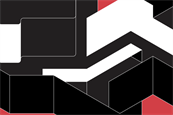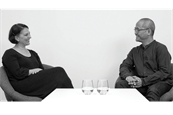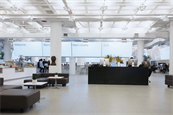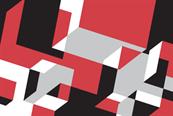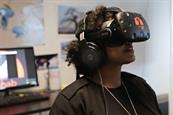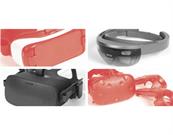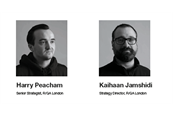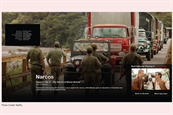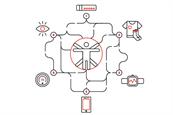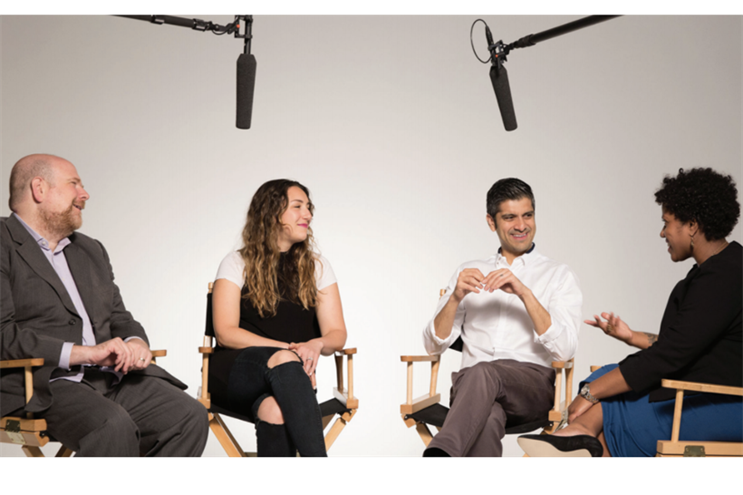
…For its 2016 Agency Report, Advertising Age named Accenture Digital's Interactive unit as the largest and fastest-growing digital agency network in the U.S. and worldwide. R/GA has been paying attention for some time. With the launch of its own Consulting practice, in 2012, the agency has been ahead of the curve, offering a new approach in which experts have the ability to put theory into practice and execute the solutions they propose.
Tara Moore: Everyone’s talking about consulting as though there’s this doomsday scenario. Is that all just hype?
Saneel Radia: I don’t know if I’ve ever really believed in doomsday scenarios. But it turns out that companies that are at least aware that there is a problem tend to persevere. The first step—accepting that a challenge exists—is a hard one, though.
When I look at the consulting industry, I can’t imagine talking to traditional management consultancies and have them not acknowledge the gap in their creativity and experience thinking. Yet if you look at all the acquisitions the traditionally defined management consultancies have made, they’ve all been in those spaces. They’ve tried to buy up digital, experience, and other creative entities. So they certainly have a lot of challenges ahead of them because there’s still that cultural gap—how to actually bring consulting and creativity together, versus just check a box.
Moore: What are some of the things companies get wrong about innovation?
Philip Rackin: Innovation can’t happen from a defensive crouch. Companies have to be open to trying new things; they have to be open to different ways of thinking.
One of the things that we’re seeing with certainly younger generations in both the workforce as well as a customer base is that they’re much more adept at assembling a lot of different types of information.
And when companies start to put people in these boxes and these hierarchies that may have worked in a classic management approach, they don’t get the kind of results that they’re really looking for. If you look at the companies that are succeeding, they are the ones that are open to a lot of change. Some of that change is going to come from the expectations that people have as both consumers and employees, of what is going to be available to them, what types of information will be available to them to very quickly make decisions and then act on them, see the results, and make another decision based on that. The more we keep things in regimented structures, the less opportunity there will be to arrive at different ways of thinking.
People are also combining things in their daily lives to get jobs done in an almost pointillistic way. They’re creating whole environments and ecosystems out of companies and services that don’t normally talk to each other. When they get into the work environment, suddenly everything is locked down. They have to use only the tools they’re given; they can get their hand slapped for trying something different and out of the way. The more we can do things in a way that fosters a "Let’s see if this works, let’s have the freedom to run down a dead end and see what we get out of this" approach, the more opportunity there will be for people and organisations to find what is going to be next for them.
Stefanie Hoffman: We were working on a project with a client recently where we had to dig into what makes a company ready to innovate, and one of the things that we learned was that companies actually fostering a growth mind-set were the ones that really innovate most successfully. A company that nurtures and enables their people, with the right tools, the right skill sets, and the right support system to take risks will be better equipped to innovate most successfully. But if a company has a fixed mind-set, it probably won’t be taking the risks that are needed to do the things that are potentially game-changing.
Moore: What are some of R/GA’s key differentiators in the consulting practice?
Radia: We’re consultants that actually make things. R/GA is famous for having world-class designers, technologists, and experience folks, and these are exactly the people who work on the consulting engagements we have.
That said, being able to appropriately package that up toward a broader business objective, as a part of a broader transformation road map with a strong understanding of how business models are changing, how digital ecosystems have altered the way consumers expect things from whatever brands they are engaging with, how different technologies impact the core business of a company, that’s what it’s really about. The idea that we can appropriately address a client team’s problems while leveraging this great experience and diverse, creative talent is our secret sauce at the moment.
Hoffman: The other thing that’s pretty critical, too, is helping to redefine how companies think about innovation. We talk about it as new and relevant, and there are probably three different ways that you can think about it. First, most companies, especially within the CPG industry, think about it as R&D, with innovation as a new flavour or new bottle, for example. Then there is how to approach a specific brief that asks us to help create a new and innovative commerce website or channel, or a new way to sell a product. The third is innovation that is completely blue-sky.
For instance, a client might say, "We have this problem; there is a disruption that is happening. Help us come up with innovative opportunities to capitalise on."
That disruption can come across as a couple of different things. It could be a business model disruption, upending the way that we do business. It could be a communications disruption, or the way that people think about data, for instance. And then lastly, it could be a commerce disruption. They may not want something in particular, but they do want our help to figure out what that thing is in order to help them succeed in the future.
Rackin: One of the things that makes R/GA really strong and different is that we sell by output, not by time. So we’re giving new advice, delivered in the right way for clients who need to act in different ways.
The more that we can keep innovating in that regard, and how we actually operate, the better we will be for our clients, because we’re not just preaching it, we’re actually living it. And I think that has given us a lot of edge. We’re competing not against agencies, not even against the innovation arms of traditional agencies.
We’re actually competing against either the big tech consultancies or even the very high-end management consultancies that are there to help the C-suite feel better about the decisions they need to make. That R/GA is able to play in those spaces is a testament to our own ability to change, not just our ability to say interesting things.
Moore: How do you all view the current state of agencies?
Radia: Agencies have had to become much more accountable around actual business-driving ideas, execution, whatever their role is. How are you drawing the line directly to business? Now that they have gotten a lot more industry acknowledgment around the direct connection between customer experience and bottom line, agencies actually have a bit of a lifeline to start climbing up into what the management consultancies previously owned.
Meanwhile, the management consultancies that are hurting are buying up shops very late in the game. Most of the big four holding companies bought up many of the notable digital and creative entities a while back.
This has led to this meeting in the middle of different companies starting with what they think they can do but pretty quickly attempting to move into others’ backyards.
Rackin: If you look at it from just a structural perspective, the consultancies have come in and said, "We have these top-level relationships we should be able to extend down." And the basis for that extension extends no further than the relationship.
The agencies, and I’ll include R/GA as an agency in this context, have a much stronger point of view for moving into other areas of business, because certainly at R/GA we make things. We operate things. We know what it means to make a decision and then live with the consequences. We understand consumer behavior and channel dynamics.
Certainly, if we don’t know these things, we’re not able to help our clients. As we move up the food chain, we’re not doing it based on having just a really good personal relationship with the C-suite; we’re doing it because of the efficacy of our recommendations and our implementations.
Radia: That’s a really good point. Innovation is unfortunately still used as a buzzword, but the early innovation era wasalot of this "fail fast, fail often, experiment here." There wasn’t much accountability, but now, it turns out that if you make things, you are by definition held more accountable.
So the agencies are saying, "We understand how to make things that are effective." That is a core advantage and they can dress it down however they want or claim that they can acquire it, but that is a different mentality. It’s a different skill set and it takes a different culture.
Hoffman: For us the accountability is obviously to our clients, because that’s who we want to serve. But I think intrinsically, too, it also applies to the rest of the agency, and we want to make sure that the things that we’re doing actually lead to positive, smart, and really innovative work. That has to come through in everything we do.
Moore: Are there any industries you believe are about to get disrupted?
Hoffman: We’ve just started to really tap into a small portion of the hospitality industry, but beyond hotels, flash back to 50 years ago and sitting in a restaurant: That experience is exactly the same as it’s always been. There’s a lot more opportunity across a number of different territories within hospitality beyond hotels.
Rackin: We’ve worked in the past with a number of automobile manufacturers, but mainly on the marketing side. That is an industry ripe for transformation on so many levels: the product itself, the conversion from a product mentality to a service mentality, and the way the products are distributed and sold, particularly in the United States but also globally. There’s so much change happening there, and nobody knows what’s really going to unfold.
Radia: There are always stages of change. Put aside the word disruption, because industries change for other reasons as well. The one thing everyone would agree is that everything is changing faster, in any industry. The one that probably held out longer than anyone would have expected is financial services, and it’s now in the midst of a tremendous amount of change.
The most underhyped innovation of today is blockchain. It is world-changing in every way, because it is so fundamentally different: This idea that the way to keep things safe was to hide it—the definition of a safe.
Blockchain, on the other hand, suggests that the safest place in the world is out in public. Just a public ledger, one that creates trust among anonymous people.
I love the idea that one of the most privatised, black box–driven industries in the world is actually questioning, Should we embrace this non–privately held technology? There has never been anything like this before.
The technology has yet to be figured out, but I’d say financial services is about to undergo some of the most dramatic change in the history of any industry.
This interview has been edited for clarity.


